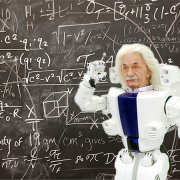Teaching an AI system the tricks physicists use to understand the real world produces an extraordinarily powerful machine.
As a student, Galileo famously observed a lamp swinging in Pisa Cathedral and timed its swing against his pulse. He concluded that the period was constant and independent of its amplitude.
Galileo went on to suggest that a pendulum could control a clock and later designed such a machine, although the first clock of this type was built by Huygens some 15 years after Galileo’s death.
In making this discovery, Galileo’s genius was to ignore all the messy details that were otherwise present in the cathedral—air resistance, temperature, flickering light, noise, other people, and so on. He considered a simple model of a swinging lamp using only its period, focusing on the salient detail.
For many historians, Galileo’s approach represents the earliest stage in the evolution of the scientific method, the same process that has produced flight, quantum theory, electronic computing, general relativity, and even artificial intelligence.
In recent years, AI systems have begun to find interesting patterns in data themselves and even derived certain laws of physics as a result. But in these cases, the AI always studied a special data set that had been isolated from real-world distractions. The ability of these AI systems is a long way from the ability of humans such as Galileo.
And that raises an interesting question: is it possible to design an AI system that develops theories the way Galileo did, zeroing in on the information it needs to explain different aspects of the world it observes?
Today we get an answer, thanks to the work of Tailin Wu and Max Tegmark at MIT in Cambridge, Massachusetts. These guys have developed an AI system that copies Galileo’s approach and some of the other tricks that physicists have learned over the centuries. Their system—called the AI Physicist—is capable of teasing out several laws of physics in mystery worlds deliberately constructed to simulate the complexity of our universe...
Read the full srticle on Technology Review's website using the link below.

